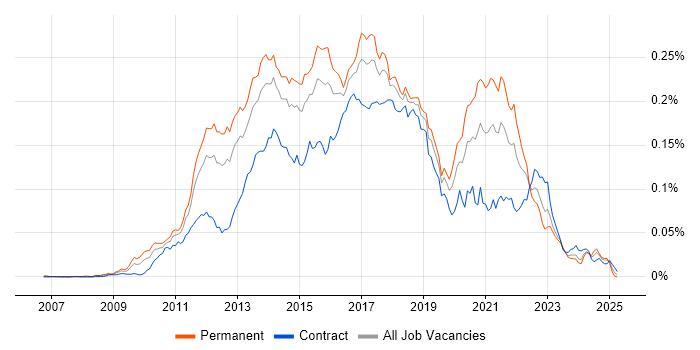Mercurial
UK
The table below provides summary statistics and salary benchmarking for jobs requiring Mercurial skills. It covers permanent job vacancies from the 6 months leading up to 5 February 2026, with comparisons to the same periods in the previous two years.
| 6 months to 5 Feb 2026 |
Same period 2025 | Same period 2024 | |
|---|---|---|---|
| Rank | - | 679 | 774 |
| Rank change year-on-year | - | +95 | +187 |
| Permanent jobs citing Mercurial | 0 | 21 | 17 |
| As % of all permanent jobs in the UK | - | 0.041% | 0.023% |
| As % of the Development Applications category | - | 0.39% | 0.21% |
| Number of salaries quoted | 0 | 11 | 16 |
| 10th Percentile | - | £37,000 | £43,125 |
| 25th Percentile | - | £47,500 | £47,500 |
| Median annual salary (50th Percentile) | - | £60,000 | £55,000 |
| Median % change year-on-year | - | +9.09% | -24.14% |
| 75th Percentile | - | £67,500 | £65,313 |
| 90th Percentile | - | - | £70,000 |
| UK excluding London median annual salary | - | £65,000 | £55,000 |
| % change year-on-year | - | +18.18% | -26.67% |
All Development Application Skills
UK
Mercurial falls under the Development Applications category. For comparison with the information above, the following table provides summary statistics for all permanent job vacancies requiring development application skills.
| Permanent vacancies with a requirement for development application skills | 3,803 | 5,319 | 7,993 |
| As % of all permanent jobs advertised in the UK | 5.87% | 10.41% | 10.96% |
| Number of salaries quoted | 2,452 | 3,053 | 6,428 |
| 10th Percentile | £28,250 | £37,574 | £36,250 |
| 25th Percentile | £41,250 | £47,500 | £46,350 |
| Median annual salary (50th Percentile) | £59,375 | £61,339 | £60,000 |
| Median % change year-on-year | -3.20% | +2.23% | -7.69% |
| 75th Percentile | £77,250 | £80,000 | £80,000 |
| 90th Percentile | £90,000 | £100,000 | £96,250 |
| UK excluding London median annual salary | £50,000 | £55,000 | £55,000 |
| % change year-on-year | -9.09% | - | - |
Mercurial
Job Vacancy Trend
Historical trend showing the proportion of permanent IT job postings citing Mercurial relative to all permanent IT jobs advertised.

Mercurial
Salary Trend
Salary distribution trend for jobs in the UK citing Mercurial.

